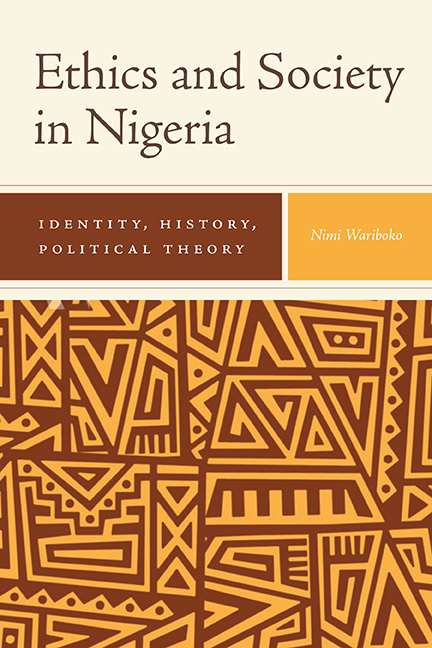Book contents
- Frontmatter
- Dedication
- Contents
- Foreword
- Preface
- Acknowledgments
- Introduction: Dead Gods, Divine Kings, and Deadly Politicians
- 1 The Emergence of the Lotus-Self: Personhood and Identity
- 2 Dead Gods and People's Revolts: Political Theory in Religious Acts
- 3 The Divine King and His Five Bodies: Living History and the Logic of Interreligious Dialogue
- 4 Governance and Deadly Politicians: History as Cultural Criticism
- 5 History without Force: Finding Present Space and Place of Time
- 6 Constructing Nigeria's Greatness: Neglected Paths of Community, Narratives, and Care of the Soul
- 7 Mythos, Virtues, and National Transformation: The Search for a Standard of Citizenship Moral Behavior
- 8 African Traditional Religion and Critical Theory: A Framework for Social Ethics
- Notes
- Bibliography
- Index
5 - History without Force: Finding Present Space and Place of Time
Published online by Cambridge University Press: 03 September 2019
- Frontmatter
- Dedication
- Contents
- Foreword
- Preface
- Acknowledgments
- Introduction: Dead Gods, Divine Kings, and Deadly Politicians
- 1 The Emergence of the Lotus-Self: Personhood and Identity
- 2 Dead Gods and People's Revolts: Political Theory in Religious Acts
- 3 The Divine King and His Five Bodies: Living History and the Logic of Interreligious Dialogue
- 4 Governance and Deadly Politicians: History as Cultural Criticism
- 5 History without Force: Finding Present Space and Place of Time
- 6 Constructing Nigeria's Greatness: Neglected Paths of Community, Narratives, and Care of the Soul
- 7 Mythos, Virtues, and National Transformation: The Search for a Standard of Citizenship Moral Behavior
- 8 African Traditional Religion and Critical Theory: A Framework for Social Ethics
- Notes
- Bibliography
- Index
Summary
Sometimes history is like shards of a broken old pot, forgotten and buried under dirt. Political theory must unearth and polish one of the shards that might rekindle patriotic and emancipatory disposition of the people and transform it into a fire pot that reignites past possibilities.
The Joy of Independence Is Gone
In 2011, for the first time in its history, Nigeria held its independence celebrations in the living compound of the Nigerian president, at the forecourt of the Aso Rock Presidential Villa, amid tight security. Because of the 2010 ghastly bombing that claimed twenty lives at Eagle Square, which was the usual venue for the celebration in the federal capital city of Abuja, the then president of the Republic, Dr. Goodluck Jonathan, moved the celebration indoors. The celebration is now principally a military affair featuring a change-of-guard parade, inspection of the guard, and a silent drill. The ceremony is devoid of pageantry; there is no youth parade, no dancing, no schoolboys or girls in an “eyes-right” march past the stand of dignitaries where they hope to catch a glimpse of the nation's leaders for inspiration, no thronging crowds to hear a presidential oration to stir the spirit of the nation to greater glory. The event is almost a somber affair; the ceremony has almost lost its meaning. This low-key version of marking Nigeria's independence from British colonialism has been going on for the past six dismal years (2011–16). Let us compare this to the mood of the nation on Saturday, October 1, 1960. At midnight, the British Union Jack was lowered and the independent green-white-green flag of Nigeria was hoisted to much acclamation, pride, and hope. Later that fateful day, the country treated itself to a grand ceremony hosted by Prime Minister Abubakar Tafawa Balewa and Governor-General Nnamdi Azikiwe. There were firework displays, dance troupes, masquerade performances, state banquets, colorful parades of joyous schoolchildren, military soldiers proudly marching in ceremonial uniforms, and festive dancing. Indeed, the country was thrown into a frenzy of celebrations and hopefulness. In his address to mark the occasion, Balewa, with overflowing emotion said,
Today is Independence Day. The first of October 1960 is a date to which for two years every Nigerian has been eagerly looking forward. At last, our great day has arrived, and Nigeria is now indeed an independent sovereign nation.
- Type
- Chapter
- Information
- Ethics and Society in NigeriaIdentity, History, Political Theory, pp. 98 - 115Publisher: Boydell & BrewerPrint publication year: 2019



